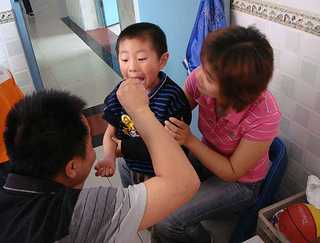Global Health Security: The Field Epidemiology Training Program (FETP)

Field investigation to explore the risk factors of hand, foot and mouth disease. Fengjie county, China, April 2011. (Photo by Yilin He)
The Field Epidemiology Training Program (FETP) helps countries increase their ability to detect and respond to health threats and to develop expertise so that disease outbreaks can to be detected at the earliest possible time. CDC works with Ministries of Health to establish field (or applied) epidemiology training programs modeled after CDC’s Epidemic Intelligence Service (EIS). FETPs provide clear and specific information so public health workers can use science and data to detect and monitor disease outbreaks and determine public health policy and programming.
Since 1980, CDC has helped establish 51 programs and, as of February 2013, supports workforce development in 47 countries. This includes the placement of a full-time, in-country Resident Advisor (RA) for 21 two-year FETPs serving 33 countries and for three programs that are less than two years in length.
CDC-supported programs have produced more than 2,800 graduates that today form a capable squadron of “disease detectives” in 70 countries. More than 80% of graduates work in government in their home countries and many obtain leadership positions within their national health systems (i.e., program chiefs, national directors for epidemiology, and heads of national and regional surveillance departments).
- Page last reviewed: December 23, 2014
- Page last updated: December 23, 2014
- Content source:
Global Health
Notice: Linking to a non-federal site does not constitute an endorsement by HHS, CDC or any of its employees of the sponsors or the information and products presented on the site.


 ShareCompartir
ShareCompartir